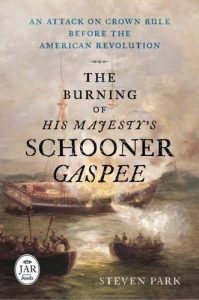The Journal of the American Revolution Book Series officially launched in 2016 with two books, Grand Forage 1778 and The Road to Concord. Between Amazon, Barnes & Noble and Goodreads, our first two series books have already received nearly thirty perfect 5-star ratings. Continuing that momentum, we are thrilled to announce our third series title—The Burning of His Majesty’s Schooner Gaspee: An Attack on Crown Rule Before the American Revolution by Steven Park—has published this week.
Steven Park is the director of Academic Services at the University of Connecticut’s maritime campus where he teaches maritime studies. He received his PhD in history from the University of Connecticut, and his articles have appeared in a number of publications, including International Maritime History, American Neptune, Journal of the American Revolution, and Connecticut History Review.
 Considered one of the first acts of rebellion to British authority over the American colonies, the Gaspee incident is put into historical context by Park’s fresh account.
Considered one of the first acts of rebellion to British authority over the American colonies, the Gaspee incident is put into historical context by Park’s fresh account.
Between the Boston Massacre in 1770 and the Boston Tea Party in 1773—a period historians refer to as “the lull”—a group of prominent Rhode Islanders rowed out to His Majesty’s schooner Gaspee,which had run aground six miles south of Providence while on an anti-smuggling patrol. After threatening and shooting its commanding officer, the raiders looted the vessel and burned it to the waterline. Despite colony-wide sympathy for the June 1772 raid, neither the government in Providence nor authorities in London could let this pass without a response. As a result, a Royal Commission of Inquiry headed by Rhode Island governor Joseph Wanton zealously investigated the incident.
In The Burning of His Majesty’s Schooner Gaspee: An Attack on Crown Rule Before the American Revolution, historian Steven Park reveals that what started out as a customs battle over the seizure of a prominent citizen’s rum was soon transformed into the spark that re-ignited Patriot fervor. The significance of the raid was underscored by a fiery Thanksgiving Day sermon given by a little-known Baptist minister in Boston. His inflammatory message was reprinted in several colonies and was one of the most successful pamphlets of the pre-Independence period. The commission turned out to be essentially a sham and made the administration in London look weak and ineffective. In the wake of the Gaspee affair, Committees of Correspondence soon formed in all but one of the original thirteen colonies, and later East India Company tea would be defiantly dumped into Boston Harbor.
 Announcing the Next Title of the JAR Series
Announcing the Next Title of the JAR Series
Continuing the series, we are also thrilled to announce our fourth title—The Invasion of Virginia, 1781—will publish in the spring of 2017.
Benedict Arnold vs. the Marquis de Lafayette. The notorious traitor to the Patriot cause and the symbol of international recognition for American independence faced off in battle in Virginia in 1781. It was a strangely symbolic contest in a region that had, for the previous six years, seen very little fighting in spite of being between two major theaters of war. Virginia had been on the sidelines, but was suddenly a focal point, and would soon be the most critical place on the continent.
The early 1781 campaigns in the Virginia tidewater, from Norfolk to Richmond, are largely overshadowed by the British advance into North Carolina. Operations in the region, however, laid the groundwork for what would be the culmination of the war, the British decision to consolidate their forces at Yorktown on the James River.
Journal of the American Revolution is proud to present the first in-depth study of this neglected phase of the war. Author Michael Cecere has distilled the accounts of political and military participants at all levels to create a compact and quick-paced narrative of sparring between British expeditionary forces sent from New York and frequently-outnumbered local American defenders. The harrowing marches, daring raids and desperate clashes of arms are detailed from the perspective of the soldiers who fought them. They were part of a rapidly-developing series of events that set the stage for the better-known actions just a few months later.







Recent Articles
Joseph Warren, Sally Edwards, and Mercy Scollay: What is the True Story?
This Week on Dispatches: David Price on Abolitionist Lemuel Haynes
The 1779 Invasion of Iroquoia: Scorched Earth as Described by Continental Soldiers
Recent Comments
"Contributor Question: Stolen or..."
Elias Boudinot Manuscript: Good news! The John Carter Brown Library at Brown...
"The 1779 Invasion of..."
The new article by Victor DiSanto, "The 1779 Invasion of Iroquoia: Scorched...
"Quotes About or By..."
This well researched article of selected quotes underscores the importance of Indian...